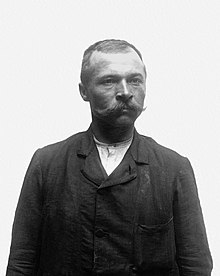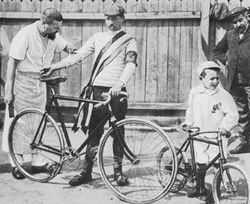Maurice Garin
One-day races and Classics Maurice-François Garin[2] (pronounced [mɔʁis fʁɑ̃swa ɡaʁɛ̃, moʁ-]; 3 March 1871[citation needed] – 19 February 1957)[3] was an Italian-French road bicycle racer best known for winning the inaugural Tour de France in 1903, and for being stripped of his title in the second Tour in 1904 along with eight others, for cheating.
The name Garin was the most common in the native village of Maurice, called "Chez-les-Garin",[7] belonging to five of the seven families.
Garin's brothers François and César stayed in northern France and, with Maurice, opened a cycle shop in the lower end of the boulevard de Paris[7] in Roubaix in 1895.
[9] Racing did not interest him but he did ride round the town fast enough to be called a madman – le fou.
He had sold his first bike and bought a lighter one – still 16 kg but with pneumatic tyres – for 850 old French francs (approx €3,000 at 2008 values).
At the finish, winning with ten minutes over the field, he gave back the bike and recovered his own the next day where he had left it.
While other riders would consume much strong red wine, Garin chose a more apt diet, and said he had survived on:[9] In 1894 he won a 24-hour race in Liège, Belgium, and the following year set an hour record for cycling behind pacers.
Garin "finished exhausted and Dr Butrille was obliged to attend the man who had been run over by two machines," said the race historian, Pascal Sergent.
[13] He started by chasing another Frenchman, Lucien Lesna, who rode the first 600 km at 28km/h and had two hours' lead at Brest.
At Rennes he stopped for a bath to recover from the tiredness, filth and heat, then found he could not get racing again into the headwind.
[16] Some of Le Vélo's advertisers had disagreed with the paper's support for Alfred Dreyfus, a soldier found guilty on trumped up charges of selling secrets to the Germans but eventually acquitted after being sent to Devil's Island.
Pierre Chany wrote: In the town which adopted Maurice Garin, at Lens, an immense procession was organised with the participation of all the notables of the region.
Before leaving Paris on Monday evening, the day after the race finished, the winner paid a visit, out of politeness, to Henri Desgrange and, in a gesture without precedent, pulled a sheet of paper from his pocket.
[21]Garin's written note said: The 2,500 km that I've just ridden seem a long line, grey and monotonous, where nothing stood out from anything else.
We never again saw him at the front of the peloton 'this little and stubborn rider of formidable consistency ... who won all the races that mattered', ... "this rider, intelligent, crafty, instinctive and calculating, ... the little chimney sweep from Arvier, in the Aoste valley near Mont Blanc' Garin also won the 1904 Tour de France, by a small margin over Lucien Pothier, but was subsequently stripped of the title which was awarded to Henri Cornet.
The race aroused a passion among spectators, who felled trees to hold back rivals and beat up others at night outside St-Étienne.
Pierre Chany wrote: In the climb of the col de la République, leaving St-Étienne, supporters of the regional rider, Faure, assault the Italian, Gerbi.
[5] There were claims, too, that the organisers had allowed Garin to break rules – at one stage being given food where it was not permitted by its chief official – because his sponsor, La Française, had a financial stake in the race.
[26] The UVF did not say precisely what had happened[27] and the details were lost when Tour archives were transported south in 1940 to avoid the German invasion and never seen again.
Lucien Petit-Breton said he complained to an official that he had seen a rival hanging on to a motorcycle, only to have the cheating rider pull out a revolver.
[28] Tales were also said to include 'Garin taking a train', a claim confirmed by a cemetery attendant looking after his grave who, as a boy, heard Garin tell his stories as an old man.
Le Père Garin, as my father and grandfather called him[n 4] used to bring out a chair in fine weather and sit in the doorway of the little office of the service station he owned at 116 rue de Lille in Lens, under the sign for Antar fuel and oil.
My barber was in the neighbouring house and I used to go there once a month to have a crew cut, [couper en brosse] which was the fashion in those days.
My friends and I were aged seven to ten and on our one-speed bikes we used to pin numbers on our back... and we never missed riding past Maurice Garin in a tight group so that he would see.
It's strange that nobody thought to take a picture of me, the little kid, alongside the first great champion of the biggest race in the world.
[29]Maurice Garin was far from an adulated hero, even less a rich champion (he spent his retirement running the service station), and I don't remember any special celebration in his honour.
[1][n 5] In 1938 Garin was awarded the gold medal of Physical Education by the Minister of Sport for France, Leo Lagrange.
as his mind brought back images of the hotels where riders signed check sheets in the first Tours.
In 2004 Les Amis de Paris–Roubaix placed a cobblestone on his grave, a traditional trophy for winners of the Paris–Roubaix race.
His biographer, Franco Cuaz, said: "Every year, the municipality sends me French people who want to see the house where he was born.




